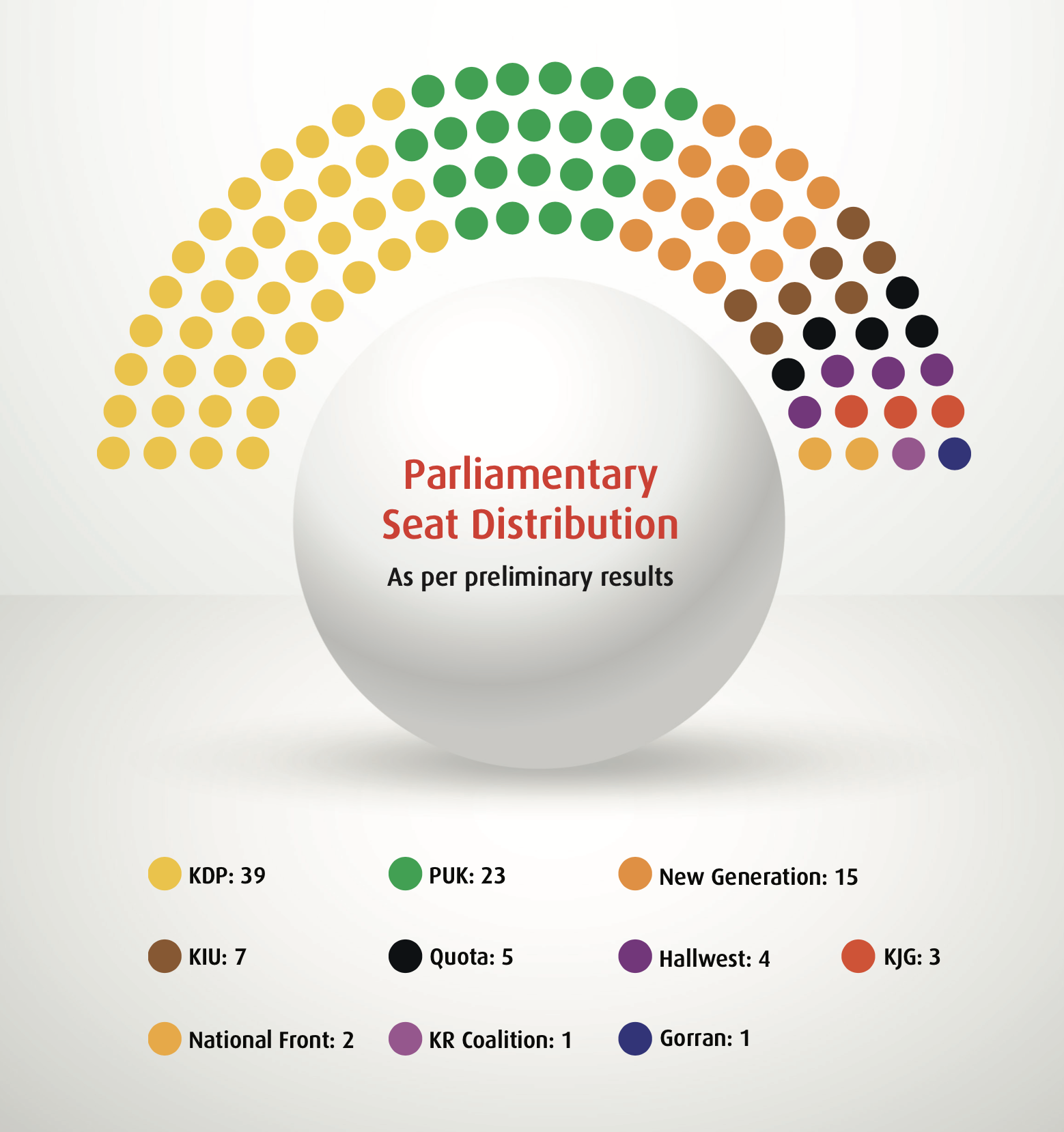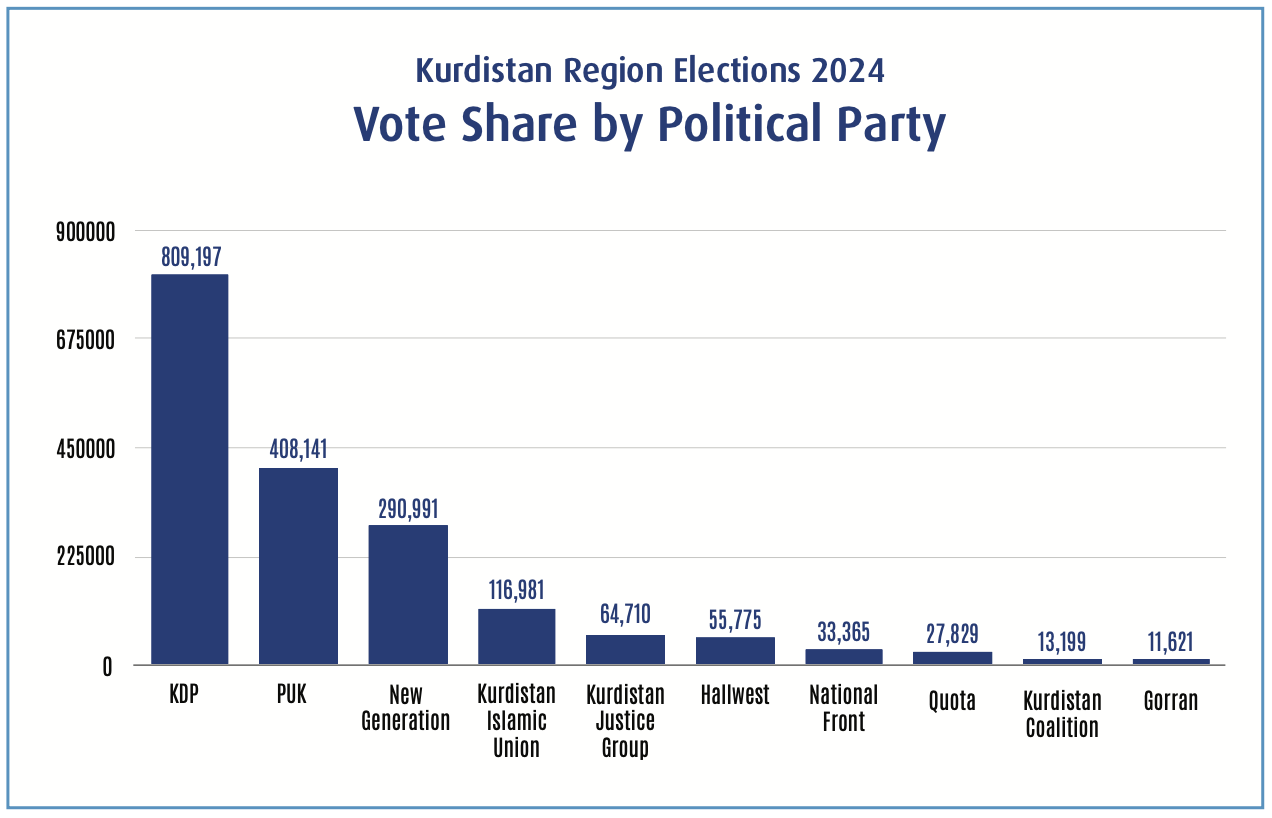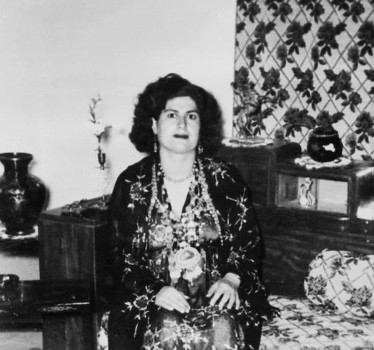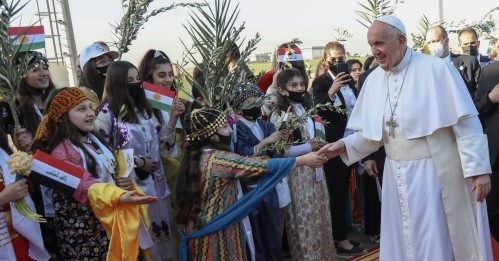Citizens in the Kurdistan Region of Iraq went to the polls on October 20 to cast their votes and elect members of the new regional parliament. This election was considered particularly important for the Kurdistan Region, not only to maintain the democratic process, but also to restore international legitimacy, as the two-year delay in holding the sixth parliamentary elections had raised concerns among key allies such as the United States and European countries.
Key players
Similar to previous elections, the Kurdistan Democratic Party (KDP) and the Patriotic Union of Kurdistan (PUK) were the main competing players, joined by other parties and some new political groups.
Historically, the KDP and PUK have maintained their position as the two parties dominating the Kurdistan Region’s political landscape. They have managed to rule the autonomous region since 1991, when a popular uprising in the Kurdish areas of Iraq expelled Saddam Hussein’s regime. Despite prolonged tensions and a devastating civil war between 1994 to 1997, these two parties have remained steadfast in their popularity even at times when new opposition movements emerged from inside their highest ranks.

KDP in the forefront
In this election, nearly 2.9 million people were eligible to vote. Compared to the previous election in 2018, this year’s polls saw a significant increase in turnout, standing at 72% across all four governorates of the Kurdistan Region.
According to preliminary results announced by the Iraqi High Independent Electoral Commission (IHEC), the KDP maintained its position on the top of the list, securing 809,197 votes, which will reserve the party at least 39 parliamentary seats.
The PUK also retained its position as the second most popular party, gaining 408,141 votes to win 23 seats in the upcoming Parliament.
The party that secured third place and surprised political observers with a sharp rise in votes was New Generation. Previously holding only eight parliamentary seats, the party will now occupy 15 seats in the 100-seat legislature.
The second election surprise came with the dramatic decline in the Gorran (Change) Movement’s popularity. Once the strongest opposition, capable of challenging every decision by the ruling parties in the Kurdistan Region, Gorran won only 11,621 votes in this election to secure a single seat. The party was established in 2009 by Nawshirwan Mustafa, a powerful member of the PUK, who left the party due to internal disputes with party leadership. However, his passing in 2017 appears to have shaken Gorran to its core.

The IHEC’s role and international reactions
The 2024 parliamentary elections in the Kurdistan Region were largely accepted as a well-organized process. Iraq’s electoral commission oversaw the election, as the legal mandate of the Kurdistan Region’s High Independent Electoral Commission had expired in 2019.
Besides representatives of political parties, at least 16 foreign diplomatic missions, 15 international non-governmental organizations, and 109 local and international media outlets monitored the polling stations.
“Volunteers from U.S. Mission Iraq will be at polling sites across the IKR and will be joined by international election experts and other diplomatic missions to observe today’s election,” U.S. Ambassador to Iraq Alina Romanowski wrote on X on October 20.
Other diplomatic missions highlighted the remarkable voter turnout, interpreting it as a strong message in support of the renewal of democratic legitimacy.
“We look forward to the resumption of the regional parliament and to the formation of a regional government as soon as possible,” the UK’s Consulate General in Erbil wrote in an online statement.
The peaceful conclusion of the election also received praise from the international community, including UN Secretary General Antonio Guterres, who encouraged all political leaders and segments of society to continue to maintain a peaceful atmosphere and resolve any electoral disputes through established legal channels.

Technical issues in polling stations
Despite the positive feedback on the IHEC’s arrangements and its relatively successful electronic system for ballot counting, most of the political parties complained about the failure of the fingerprint registration system. IHEC utilized a cache of voter fingerprints made through a previous registration process to prevent illegitimate votes and keep the ballot boxes as clean as possible.
However, in many polling stations across the Kurdistan Region, there were reports of malfunctioning electronic devices that did not recognize voters’ fingerprints, despite them having legitimate biometric cards.
History of elections in the Kurdistan Region
On May 19, 1992, six months after the popular Kurdish uprising expelled the Saddam Hussein regime from the region, the first parliamentary elections were held in the Kurdistan Region of Iraq, with a minimum threshold of 7% set for representation in the parliament. It was the first chance for the Kurds to vote for their representatives and marked a turning point in the history of the Kurdish struggle for freedom, self-rule, and democracy.
The 1992 election led to the formation of the first Kurdistan Parliament – initially named the Kurdistan National Assembly. The leadership and people of the Kurdistan Region decided to adopt and abide by all Iraqi laws except for those that violated international human rights. The Kurdistan National Assembly convened for the first time on July 15, 1992, and passed Law No. 1, which established the Assembly as the region’s legislature. Over a decade later, in 2009, the Kurdistan National Assembly was renamed the Kurdistan Parliament.
To date there have been six region-wide parliamentary terms, following elections in 1992, 2005, 2009, 2013, 2018, and most recently 2024. In February 2009, several amendments were made to the Kurdistan election law to increase inclusiveness for all groups. The minimum age of parliamentary candidates was also lowered from 30 to 25 years old, while the legal minimum quota of female parliamentarians was raised from 25% to 30% of the legislature.
Sardar Sattar is a translator and journalist based in the Kurdistan Region. He has an MA in English Studies from the University of Lodz, Poland. He has translated several books and political literature into Kurdish and English. He writes regularly for local and international newspapers and journals.

